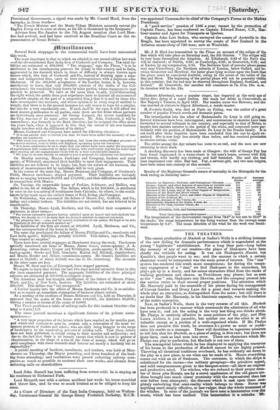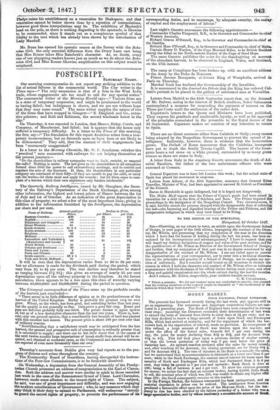THE THEATRES.
The recent production of Macbeth at Sadler's Wells is a striking instance of the new feeling for dramatic performances which is engendered at the young " legitimate" establishment. For a long time past—long before the memory of any of our readers—the plays of Shakspere have been chiefly the vehicles for acting. It was not Shakspere's Hamlet, but Kemble's, that people went to see; and the manner in which a certain character would be interpreted was the main point of interest. The " star " system has rendered this truth more conspicuous; for during the tempo- rary engagement of a " star," we find Shakspere in the ascendant, his plays got up in a hurry, and his minor characters filled from the ranks of walking gentlemen and chorus, as Providence may please; but as soon as the " star " sets, Shakspere sets likewise, and the company pressed into the service retire to their several proper positions. The attention which Mr. Macready paid to the ensemble of his pieces during his management of Covent Garden and Drury Lane did a great deal towards making the whole play an attraction, as distinguished from the actor; but still there is no doubt that Mr. Macready, in his histrionic capacity, was the foundation of the entire enterprise.
Now, at Sadler's Wells, there is the very reverse of all this. Macbeth has been produced in a manner which commands the admiration of all who have seen it; and yet the acting is the very last thing one thinks about. Mr. Phelps is certainly effective in some portions of the play, and Miss Laura Addison is just passable; but neither one nor the other is at all valuable except as a portion of a well-organized whole. If Mr. Phelps does not perceive this truth, he overrates la's power as actor or under- rates his merits as a manager. There will doubtless be ingenious admirers to tell him that his Macbeth, as a piece of acting, is first-rate; but these are ignes fatal, such as lead men into error. There are characters which Mr. Phelps can play to perfection, but Macbeth is not one of them.
The managerial talent which he has displayed in applying the resources of his house to the production of Macbeth cannot be too highly praised. Throwing all theatrical traditions overboard, he has evidently sat down to the play as a new piece, to see what can be made of it. Hence everything• comes out with an air of freshness. The costumes, in which the stripe is substituted for the tartan--the military groupings—the primitive aspect, and solid sumptuousness given to the banquet-scene—all show an original and productive mind. The witches, who are reduced to thea proper num- ber of three plus Hecate, are by a novel application of the old gauze me- dium brought into much closer proximity with the supernatural than hen ever before been attempted; the dimness which is cast upon them com- pletely embodying that semi-reality which belongs to them. Never was anything more simply effective, or less vulgar, than the whole treatment of the witches. In some of the journals we have seen a lamentation over the music, which has been omitted. This lamentation is a mistake. Mr.
Phelps raises his establishment on a veneration for Shakspere; and that veneration cannot be better shown than by a rejection of interpolations, however good those interpolations may be. The exhibition of Macbeth's head on the pole, as there is nothing disgusting in the spectacle, is likewise to be commended, since it stands out as a conspicuous symbol of that fidelity to the text which has already been shown by the introduction of Lady Macduff.



























 Previous page
Previous page